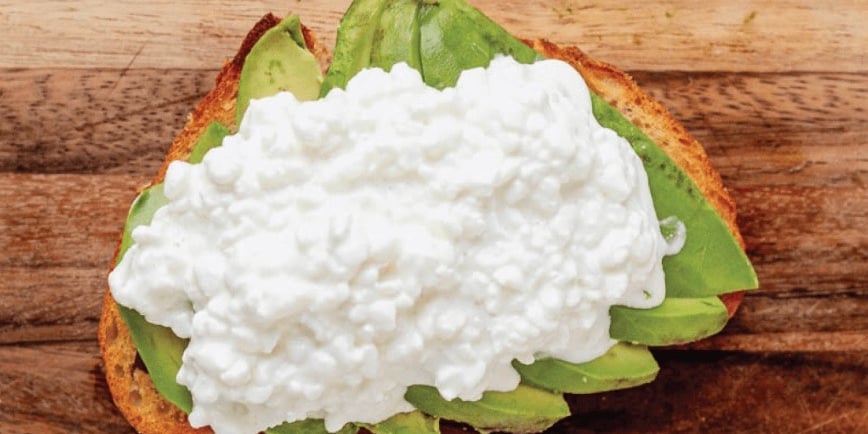Ricotta vs Cottage Cheese
Differences between ricotta and cottage cheese — from taste and texture to nutrition, cooking uses, and which one’s healthier for you.
CHEESE COMPARISONS
Ryan Hagen
10/4/20254 min read


Ricotta and cottage cheese look fairly similar, but don't be fooled, they are actually quite different types of cheese. Both cheeses are soft, white, and mild, often used in lasagna, pasta dishes, and desserts, but each brings its own personality to the party.
In this guide, we’ll explore the key differences between ricotta vs cottage cheese, from their origins and how the cheeses are made, to taste, texture, nutrition, and best culinary uses. Whether you’re cooking Italian classics or looking for a healthy protein boost, understanding these two cheeses will help you choose the right one every time.
🧭 Ricotta vs cottage cheese: Origins and history
Ricotta
Ricotta hails from Italy and literally means “re-cooked.” Traditional ricotta isn’t made from milk, but from the whey left over after making other cheeses, such as mozzarella or provolone. Italian cheesemakers would heat the leftover whey, causing remaining proteins to coagulate into a fine, fluffy curd. It's a thrifty and delicious way to use every last drop of milk.
Today, most ricotta sold outside Italy is made from whole or part-skim cow’s milk, although sheep, goat, and buffalo milk varieties still exist in Italy.
Cottage Cheese
Cottage cheese traces back to rural Europe and the United States, where it was one of the easiest cheeses to make at home, hence the name “cottage” cheese. It’s made by curdling milk with an acid (like vinegar or lemon juice), then draining most of the whey. The result is a mild, chunky cheese with soft curds that can be sold as fresh cheese.
Unlike ricotta, cottage cheese often has a “creamed” version, where milk or cream is added back in to make it richer and smoother.
🧪 Cottage cheese vs ricotta: How they’re made
The biggest difference lies in texture and structure. Ricotta’s tiny curds give it a smoother, grainier consistency, while cottage cheese has distinct curds that vary in size from small to large, depending on the style.
👅 Taste and texture
Both cheeses are mild, but they shine in different ways:
Ricotta has a sweet, creamy, and delicate flavor with a fine, grainy texture that spreads easily. It’s less tangy and slightly drier than cottage cheese.
Cottage cheese has a mildly tangy, milky, and salty taste, with a more noticeable curd structure. It feels wetter and chunkier on the tongue.
If you’re baking or making desserts, ricotta’s smoother consistency works better. For savory dishes or protein snacks, cottage cheese is usually preferred.
🍽️ Best uses in cooking
Ricotta in the Kitchen
Ricotta’s delicate sweetness and smooth texture make it a favorite in Italian cooking. It’s versatile enough for both savory and sweet dishes, including:
Lasagna and stuffed pasta (like ravioli or manicotti)
Ricotta pancakes and cheesecakes
Cannoli filling
Gnocchi and baked pasta dishes
Whipped ricotta toast with honey or roasted vegetables
It blends beautifully into batters and fillings, giving foods a creamy richness without being heavy.
Cottage Cheese in the Kitchen
Cottage cheese is beloved in North America for its high protein and low fat profile. It’s often eaten on its own, but it’s also great in:
Smoothies and breakfast bowls
Protein pancakes and muffins
Salads and wraps
Savory dips
Baked dishes like casseroles or lasagna (as a lower-fat substitute for ricotta)
Because of its mild, tangy flavor, it pairs well with both sweet and savory ingredients.
🥣 Can you substitute one for the other?
You can, but there are some caveats.
If you’re out of ricotta, cottage cheese can be a suitable substitute in lasagna, stuffed shells, or dips. Just blend it in a food processor for a smoother texture. You might notice a tangier flavor, but most people won’t mind once it’s baked or mixed into a sauce.
If you’re replacing cottage cheese with ricotta, keep in mind that ricotta is creamier and slightly sweeter, so it might alter the texture in cold dishes like salads or snacks.
Pro tip:
If you’re watching calories, opt for low-fat cottage cheese because it’s lighter than ricotta and packs more protein per serving.


⚖️ Ricotta vs cottage nutrition comparison
Both cheeses are healthy in moderation, but they differ in fat, protein, and sodium content. Here’s a breakdown (per 100g serving):
✅ In summary:
Ricotta is richer and higher in fat, but also higher in calcium.
Cottage cheese is leaner, higher in protein, and often lower in calories.
For heart-healthy diets or weight loss, cottage cheese is often the better everyday choice. For indulgent cooking, ricotta wins on texture and flavor.
🧠 Health benefits of ricotta and cottage cheese
Ricotta
Good source of calcium for bone health
Contains whey protein, which supports muscle repair
Low in sodium, making it a gentler option for people watching salt intake
Cottage cheese
High in casein protein, which digests slowly and helps with satiety
Rich in B vitamins and phosphorus
Popular among athletes for muscle recovery and weight management
Both can be easily incorporated into a balanced diet when consumed in moderation.
🌿 Storage and shelf life
Both cheeses are fresh and perishable:
Ricotta typically lasts up to 5 days after opening.
Cottage cheese can last 5–7 days once opened, but check for sour smells or watery separation.
Always store them in the coldest part of the refrigerator and avoid freezing, as this can ruin the texture.
🍷 Pairings and complements
Here’s how to make both cheeses shine in cheese pairings and recipes:
Final thoughts on ricotta vs cottage cheese
While they may look similar, ricotta and cottage cheese have distinct personalities:
Ricotta: creamy, rich, and slightly sweet — perfect for baking and Italian dishes.
Cottage Cheese: tangy, chunky, and high-protein — great for healthy snacks and savory recipes.
In short:
Choose ricotta for creamy, indulgent dishes.
Choose cottage cheese for lighter, protein-packed meals.
Whichever you pick, both add flavor, texture, and nutrition to your kitchen lineup, proving that even the simplest cheeses can have their own charm.
Cheese Soul
Explore the world of cheese and lifestyle.
© 2025. All rights reserved.
